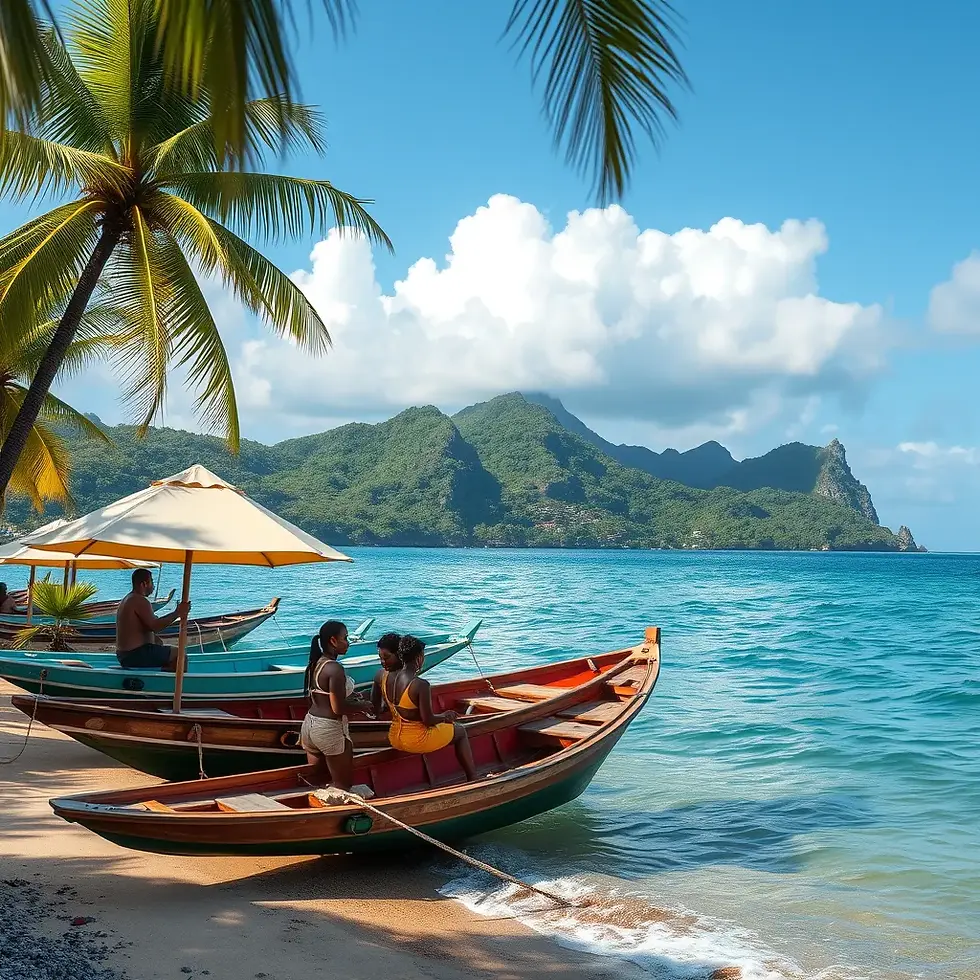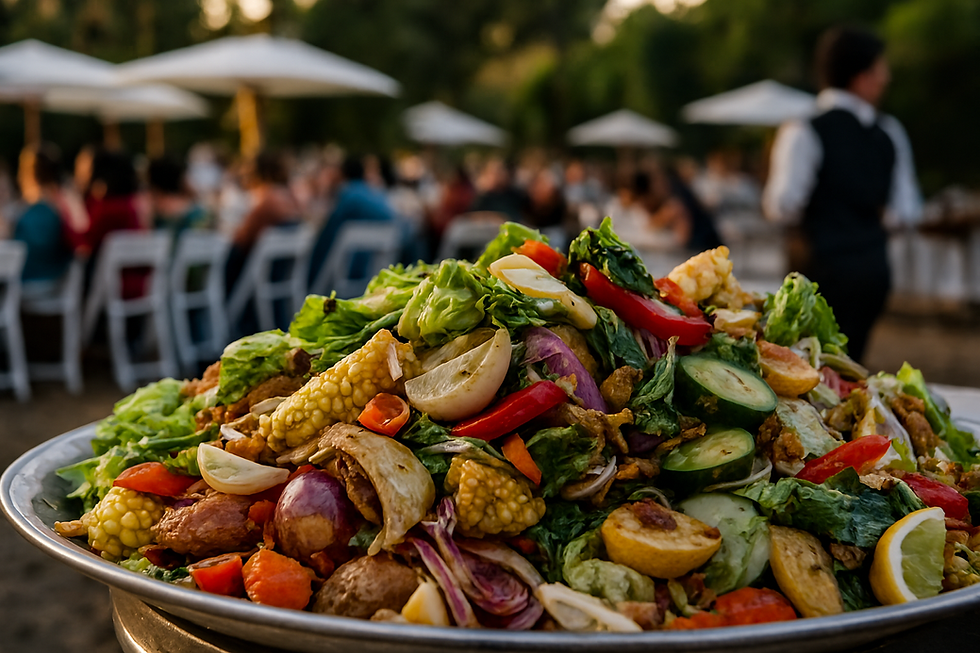Weather & Seasonality: When Is the Best Time for an Eco and Sustainable Event in Tobago?
- Avion W. Anderson
- Jul 3
- 4 min read
Tobago, the smaller yet lush and breathtakingly beautiful island of Trinidad and Tobago, is a dream destination for eco-conscious and sustainable events. Known for its pristine beaches, vibrant marine life, and lush rainforest, Tobago’s natural beauty offers the perfect backdrop for weddings, retreats, festivals, and conscious gatherings.
But if you’re planning an eco-friendly or sustainable event, timing is everything. Understanding Tobago’s weather patterns and peak seasons ensures your event not only succeeds but leaves a positive, lasting impact on the island's environment and community.

Understanding Tobago's Climate
Tobago doesn’t follow the traditional four-season calendar. The island enjoys a tropical climate year-round, characterized by warm temperatures and high humidity. The island has two distinct seasons:
Dry Season (January to May) - represents the optimal window for eco-friendly events. This period is characterized by minimal rainfall, consistently high temperatures, and lower humidity levels. The dry season offers the most predictable weather conditions, with sunny skies, minimal rainfall, and steady breezes making this the ideal period for outdoor and eco-conscious events that rely on natural settings
Wet Season (June to December) - coincides with the Atlantic hurricane season and brings increased rainfall and humidity. Expect tropical showers, higher humidity, and occasional thunderstorms. While rain typically falls in short, intense bursts rather than continuous downpours, although most mornings and early afternoons are often clear this season presents additional challenges for event organizers focused on environmental sustainability.

Key Weather Considerations for Eco Events
Sunlight: Eco events often use natural lighting to reduce energy use. The dry season provides plenty of bright, sunny days.
Rainfall: Sustainable event planning includes contingency strategies like tents and water management. The wet season requires careful planning to protect both guests and the environment.
Wind: Coastal venues and open-air locations experience cooling trade winds, especially from January to April, which enhances comfort and reduces the need for fans or air conditioning.

Best Times for an Eco and Sustainable Event in Tobago
Prime Season: January - February
January and February are often considered the best months to visit Tobago as there's minimal rain and consistently high temperatures without stifling humidity.
These months offer several advantages for eco-events:
- Minimal Environmental Impact: Low rainfall reduces the risk of soil erosion and damage to natural venues
- Optimal Conditions for Renewable Energy: Consistent sunshine supports solar-powered event infrastructure
- Reduced Waste Management Challenges: Dry conditions facilitate proper waste sorting and recycling programs
- Enhanced Outdoor Activities: Perfect weather for nature-based educational programs and eco-tours
However, event organizers should note that this peak season brings increased tourism and competition for venues, particularly around February's carnival season.
Extended Optimal Period: March - May
If you want to avoid the heavy rainfall and hurricane season, the best time to go to Tobago is between January and May.
There's a lot less rainfall and temperatures are still high. March through May extends the prime window for sustainable events, offering:
- Continued Dry Weather: Maintaining ideal conditions for outdoor eco-activities
- Reduced Tourist Crowds: Lower competition for sustainable venues and accommodations
- Pre-Hurricane Season Stability: Avoiding the unpredictability of the wet season
- Optimal Growing Conditions: Supporting local agriculture and farm-to-table initiatives
Alternative Considerations: June - July
June and July are perfect for taking advantage of higher temperatures and quieter beaches inside school term time – perfect for adults-only Tobago holidays.
While entering the wet season, these months can work for specific eco-events:
- Educational Focus: Ideal for adult-oriented environmental workshops and training
- Reduced Competition: Lower tourism allows for better rates at eco-certified accommodations
- Increased Biodiversity: Wet season brings enhanced wildlife viewing opportunities
This is an excellent time for intimate retreats and workshops focused on mindfulness and sustainability.
Sustainable Event Planning Considerations
Environmental Factors
The timing of your eco-event should align with Tobago's natural cycles. The Dry Season runs between December and May and is normally dry and sunny, although rain can be experienced, particularly overnight and just before dawn.
This predictable pattern allows for:
- Efficient Resource Management: Reduced need for backup power and covered venues
- Minimal Ecological Disruption: Dry conditions protect sensitive ecosystems from foot traffic damage
- Enhanced Carbon Footprint Reduction: Optimal conditions for renewable energy use
Infrastructure and Logistics
Tobago's growing commitment to sustainable tourism provides excellent infrastructure for eco-events. In Tobago, two accommodations, Castara Retreats and Hibiscus Heights, have recently been added to the list of internationally certified Green Key hotels, bringing the total number of certified properties on the island to seven.

Seasonal Recommendations by Event Type
Large-Scale Eco Conferences: January - March
Optimal weather for outdoor exhibitions and workshops
Maximum attendance potential during peak tourism season
Reliable conditions for technology and equipment
Environmental Education Programs: February - April
Stable weather for field studies and nature walks
Ideal conditions for marine conservation activities
Consistent temperatures for all-day outdoor programs
Sustainable Tourism Events: March - May
Avoiding peak crowds while maintaining good weather
Better rates at eco-certified accommodations
Optimal conditions for showcasing natural attractions
Research and Conservation Workshops: April - June
Transition period offers unique biodiversity observations
Moderate tourism levels allow for focused activities
Beginning of wet season provides learning opportunities about ecosystem changes

Final Thoughts: Your Perfect Tobago Eco Event Awaits
The optimal time for eco and sustainable events in Tobago falls squarely within the dry season, with January through May representing the ideal window. January and February offer the most predictable conditions but come with increased competition and costs. March through May provides an excellent balance of favorable weather, reduced crowds, and optimal conditions for sustainable practices.
Event organizers should prioritize this dry season period to maximize the environmental benefits of their sustainable initiatives while ensuring the best possible experience for participants.
The consistent weather patterns during this time support renewable energy use, reduce waste management challenges, and minimize the ecological impact of events on Tobago's pristine natural environment.
For those willing to work with variable weather conditions, the early wet season months of June and July can offer unique opportunities for specialized eco-events, particularly those focused on environmental education and research, while taking advantage of reduced tourism pressure and potentially lower costs.



Comments